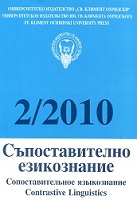Ein Fragment der kontrastiven Analyse konzessiver Adverbialsätze im Russischen und Bulgarischen (russ. daže esli, esli daže - bulg. dori (i) da, daže (i) da, i da, păk i da)
A fragment of the contrastive analysis of concessive adverbial clauses in Russian and Bulgarian (russ. daže esli, esli daže - bulg. dori (i) da, daže (i) da, i da, păk i da)
Author(s): Teodora Todorova-LudwigSubject(s): Language studies, Language and Literature Studies, Theoretical Linguistics, Syntax, Semantics, Eastern Slavic Languages, South Slavic Languages
Published by: Софийски университет »Св. Климент Охридски«
Keywords: Russian; Bulgarian; contrastive analysis; adverbial clauses;
Summary/Abstract: This article aims to introduce and to make a contrastive analysis of some functionally identical adverbial constructions from the Russian and the Bulgarian languages. In the following the question will be discussed, to what extent there are similarities (or differences) between the Russian and the Bulgarian representation of concessive clauses as a kind of subordinate clause. The main object of the analysis are concessive clause structures, that are introduced by different Russian and Bulgarian generalized concessive conjunctions. Their syntactic as well as their semantic structure will be examined by using Russian and Bulgarian examples. The basic idea of this analysis is formed by the assertion, that different conjunctions express not only different constructions but also certain semantic nuances.
Journal: Съпоставително езикознание / Сопоставительное языкознание
- Issue Year: 2010
- Issue No: 2
- Page Range: 26-34
- Page Count: 9
- Language: German
- Content File-PDF

